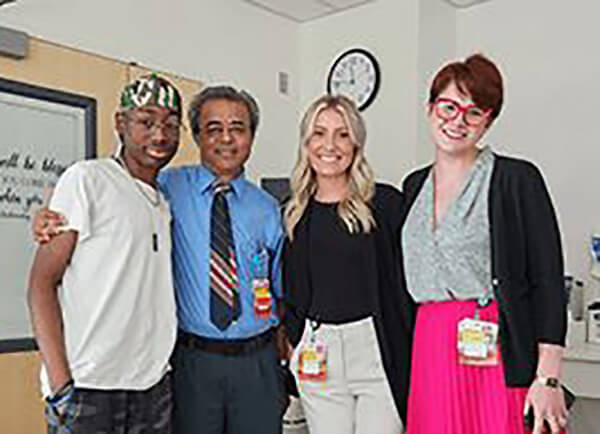Patient Triumphs Over Sickle Cell Disease with Groundbreaking Gene Therapy
August 05, 2023
UH Research & Education Update
Sickle cell disease almost killed Canaan Evans in December 2021.
The 21-year-old University Heights man developed acute chest syndrome, a pneumonia-like lung infection, which put him on a ventilator. This crisis convinced Canaan and his family that he should try gene therapy.
 Patient Canaan Evans with Dr. Jignesh Dalal and UH staff.
Patient Canaan Evans with Dr. Jignesh Dalal and UH staff.Canaan underwent the groundbreaking treatment on June 19. The gene therapy worked, and the trial's success means Canaan's body can now independently produce healthy blood cells. Early test results show he no longer has the disease, says Jignesh Dalal, MD, UH Director of Marrow and Stem Cell Transplant.
This success potentially creates a path to a cure for the thousands of people who suffer from sickle cell disease, Dr. Dalal says.
The disease distorts the shape of red blood cells into to crescent or sickle-like shapes, which clump together and block blood flow. These blockages cause tremendous pain and eventually damage organs and joints throughout the body.
Gene therapy involves extracting the patient's own stem cells, using CRISPR technology to modify faulty genes, then reintroducing the altered stem cells into their body. The process eliminates the need for compatible donors.
Dr. Dalal spearheaded the clinical trial, acknowledging the critical contribution of various teams, including the transplant, adult and pediatric sickle cell, blood bank, pain management and research teams.
Canaan spent 2022 preparing for the trial, enduring eligibility tests, having large volumes of blood drawn for cell collection and undergoing intense chemotherapy. He also had his sperm collected and frozen since chemotherapy sometimes causes fertility issues.
Once the gene therapy began, Canaan received his modified blood cells through infusion. He gradually improved until reaching the required white blood cell count of 500 or more for three consecutive days, indicating a successful cure. Dr. Dalal aims to continue clinical trials, including sickle cell patients aged 12 to 18.
“My dream is that gene therapy treatment will reach millions of people with sickle cell disease in poor countries around the world," he says.
Now free from acute pain and chronic fatigue, Canaan looks forward to an exciting future, ready to pursue new possibilities.
"I won't have to limit myself so much – I can do more things in my life and finally have some fun," he says. “I want to enroll in culinary school, which wasn't possible before."
Tags: Sickle Cell


